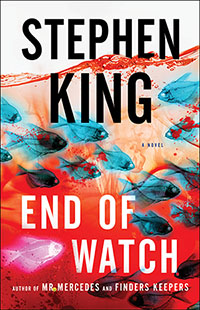At the Top of His Game
With End of Watch, Stephen King combines detective fiction and the supernatural suspense of his early career
Stephen King’s fifty-fifth novel, End of Watch, represents, to this constant reader, a full-circle moment: it’s possible to see in this final volume of his Bill Hodges trilogy a writer’s evolution and his return to form, both in one. End of Watch begins as a detective novel with a noir feel and an authorial voice I might not have recognized back in the 1980s, as a twelve-year-old devouring the horror master’s every written word.
 During the early years of his career, King grappled again and again with the battle between good and evil in such novels as Salem’s Lot, The Stand, and It, but his preoccupation with monsters and ghosts seems to have given way to more earthly concerns. But with End of Watch, King combines detective fiction and the supernatural suspense of his early career to great effect in the forms of mind control, body-swapping, and telekinesis, a la Carrie and Firestarter.
During the early years of his career, King grappled again and again with the battle between good and evil in such novels as Salem’s Lot, The Stand, and It, but his preoccupation with monsters and ghosts seems to have given way to more earthly concerns. But with End of Watch, King combines detective fiction and the supernatural suspense of his early career to great effect in the forms of mind control, body-swapping, and telekinesis, a la Carrie and Firestarter.
The conclusion of the Bill Hodges trilogy brings back Brady Hartsfield, the psychopathic perpetrator of the Mercedes Massacre, who deliberately drove into a crowd of thousands of employment-seekers standing in line at a job fair. For five years, Hartsfield has been locked, unresponsive, in a clinic for victims of traumatic brain injury, unlikely to recover. But retired police detective Bill Hodges begins to suspect that Hartsfield is awake after all, and in possession of deadly new powers.
When Bill and his former partner, Holly, are called to a murder-suicide with ties to the Mercedes Massacre, they find themselves dealing with a kind of murderer they haven’t encountered before, and one they can’t quite believe in. Hodges’s logical mind tells him Hartsfield can’t be awake and aware—“Whatever happened,” he thinks, “it can have nothing to do with Brady Hartsfield, because Holly literally bashed his brains out”—but his instincts are telling a different truth: “Still . . .his stomach gives a warning twinge.”
 Hodges is an unlikely hero, on the cusp of seventy and in poor health. As I read, I couldn’t help wonder if Stephen King might be addressing his own mortality through this same-age protagonist, a man working at the top of his game until the end. As his protagonist reflects, “End of watch is what they call it, but Hodges himself has found it impossible to give up watching.”
Hodges is an unlikely hero, on the cusp of seventy and in poor health. As I read, I couldn’t help wonder if Stephen King might be addressing his own mortality through this same-age protagonist, a man working at the top of his game until the end. As his protagonist reflects, “End of watch is what they call it, but Hodges himself has found it impossible to give up watching.”
Not to suggest that King is anywhere near the end of his own nocturnal watch: as one who has devoured all fifty-five of his books, from Carrie to this latest, I’m hoping for at least fifty-five more. King has continued to be prolific at a time when another author in his place might consider resting on his laurels. Back in 2002, he did tell the Los Angeles Times he was thinking about retirement. He has a few more projects to complete, he said, but “Then that’s it. I’m done.” I’m grateful he changed his mind. King appears to have a compulsion to tell stories, a drive that won’t allow him to stop. King is a man who hasn’t wasted the magic juice he has been allotted. He continues to milk every drop.
This, as much as the product of King’s literary labors, is what I admire about him. He has honored his gift. He recognizes the privilege it is to connect with readers. There is a demand, perhaps even a psychological need, for the scary dreams he produces. I can tell you what he gave me, a strange child who lived on stories: a safe way of looking into the dark. And I’ll tell you what he’s shown a forty-year-old writer who wonders sometimes if the passion to create dies with age: it might change, but it won’t go away. It lasts until the end of the watch.

Novelist Amy Greene is the New York Times-bestselling author of Bloodroot and Long Man. Her third novel, The Nature of Fire, is forthcoming from Knopf. Greene lives with her family in the Tennessee foothills of the Smoky Mountains.


